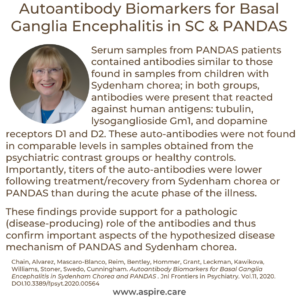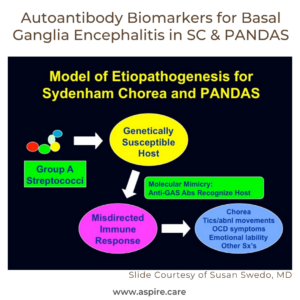Susan Swedo, MD on new research on Autoantibody Biomarkers for Basal Ganglia Encephalitis for PANDAS and SC
Autoantibody Biomarkers for Basal Ganglia Encephalitis in Sydenham Chorea and Pediatric Autoimmune Neuropsychiatric Disorder Associated With Streptococcal Infections
 The research article states that “movement, behavioral, and neuropsychiatric disorders in children have been linked to infections and a group of anti-neuronal autoantibodies, implying dopamine receptor-mediated encephalitis within the basal ganglia.”
The research article states that “movement, behavioral, and neuropsychiatric disorders in children have been linked to infections and a group of anti-neuronal autoantibodies, implying dopamine receptor-mediated encephalitis within the basal ganglia.”
The goal of the study “was to determine if anti-neuronal biomarkers, when used as a group, confirmed the acute disease in Sydenham chorea (SC) and pediatric autoimmune neuropsychiatric disorder associated with streptococcal infections (PANDAS).”
Dr. Swedo briefly explains the importance of this research and its results.
The Frontiers article is an important replication and extension of previous work by Dr. Madeleine Cunningham and her colleagues. The investigation reports results of assays done on samples obtained from 60 PANDAS patients, 8 children with Sydenham chorea, and 2 “control” groups — children with other psychiatric/neurologic disorders (25 with OCD, 18 with attention deficit hyperactivity disorder (ADHD) and 18 with Tourette disorder), and 28 healthy controls.
Using direct enzyme-linked immunosorbent assay (ELISA) techniques, the investigators found that serum samples from PANDAS patients contained antibodies similar to those found in samples from children with Sydenham chorea; in both groups, antibodies were present that reacted against human antigens: tubulin, lysoganglioside Gm1, and dopamine receptors D1 and D2. These auto-antibodies were not found in comparable levels in samples obtained from the psychiatric contrast groups or healthy controls.
Importantly, titers of the auto-antibodies were lower following treatment/recovery from Sydenham chorea or PANDAS than during the acute phase of the illness. Changes were also seen in the activity of the calcium/calmodulin-dependent protein kinase II (CaMKII) pathway during the course of illness.
Taken together, these findings provide support for a pathologic (disease-producing) role of the antibodies and thus confirm important aspects of the hypothesized disease mechanism of PANDAS and Sydenham chorea.

Slide Courtesy of Susan Swedo, MD
Note: Although these findings provide some scientific support for the utility of the “Cunningham panel” (Moleculera Labs), the results of this investigation came from Dr. Cunningham’s research lab at the University of Oklahoma (a separate entity). Thus, the results are not a direct endorsement of the Cunningham panel’s clinical utility or other commercially available tests.
Study: Chain Jennifer L., Alvarez Kathy, Mascaro-Blanco Adita, Reim Sean, Bentley Rebecca, Hommer Rebecca, Grant Paul, Leckman James F., Kawikova Ivana, Williams Kyle, Stoner Julie A., Swedo Susan E., Cunningham Madeleine W. Autoantibody Biomarkers for Basal Ganglia Encephalitis in Sydenham Chorea and Pediatric Autoimmune Neuropsychiatric Disorder Associated With Streptococcal Infections. Jnl Frontiers in Psychiatry. Vol.11, 2020. DOI.10.3389/fpsyt.2020.00564

8 comments to Susan Swedo, MD on Autoantibody Biomarkers for Basal Ganglia Encephalitis
Dianna Zaffina
June 30, 2020Can you email me because I’m pretty sure this is why my daughter tics and we did lab work with Madeleine Cunningham years ago
Gabriella True
July 7, 2020Hi. Our president has emailed you.
Adam H.
July 8, 2020Can Pans/pandas happen to someone in adulthood? Someone who had ocd before, but whose symptoms dramatically got worse, i.e. body and muscle movement rituals and sensory triggered compulsions that were not present before being diagnosed and treated with a bad case of strep?
Gabriella True
July 8, 2020Hi Adam. We have emailed you.
Yes, adults can get PP – There is no age requirement as per the diagnostic criteria. The pediatric population is the studied population but we know many adults who either had it as a child and still have it or they have adult onset.
Lauri Muse
July 17, 2020Hello
My daughter is 14 has had symptoms most her life.. she’s now being treated but with no changes at all. For last 9 months. She’s getting older and has slow slow development! She wants friends and to learn. We now think she needs traumatic brain injury treatment.. intense cognitive academic work. She is like 9 years old emotionally and socially even younger. She will need lots of social skill work. We live in northern KY near Cincinnati Ohio but I’ll drive for another doctor to help
Us. We live near Cincinnati Children’s hospital. We need tutors! She’s getting older and such. We homeschool and have never used the school yet. I might call them.
Gabriella True
July 24, 2020I have sent you an email.
Corinne Whitson
August 28, 2020I would love to connect with you as I have many questions about this. Email or call 937-657-2458
Carole Frazier
September 14, 2020My Grandson age 22 has suffered with extreme OCD started age 8 has had numerous strep infection
He was diagnosed Autism age 2-3 years
Has never been officially diagnosed with PANDAS or PANS
Although seen many doctors
Have read your studies for many years
He has been on antibiotics now on again 2nd week still no difference in OCD or flares trauma
What would you suggest to help this devastating trauma flare ect he’s going through
Affecting his family as well
Aware of IVIG
Sincerely
Carole Frazier